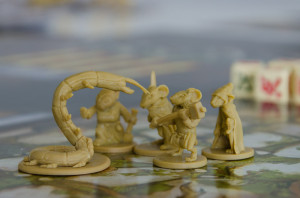
Why? This is the latest acquisition in our cooperative board game kick. After playing Robinson Crusoe (recommended 10 and up) and realizing how long it took us to understand all the rules, we decided to go down in age (9 and up!) rather than to anything that might be even more complicated.
How’d it go? The idea is that you were once important people in a kingdom in which some treacherous things are afoot, and your only hope to save the kingdom was to transform yourselves into mice and engage various missions around the castle. Each game is a chapter from the story with a prologue and story moments as you advance through the game. The game itself involves teaming up to fight various enemies: cockroaches, rats, spiders, centipedes, a cat, a crow; sometimes these have boss powers depending on what’s going on in the story. The tokens for the game are miniatures of the different characters (see photo), and this is good for adding atmosphere.
Downside is there’s a lot of dice-rolling and this can get a little repetitive after awhile, so it’s not the kind of thing you are going to spend an entire day engrossed in, but it’s clever and fun and nicely paced.
Will you do it again? We’re through Chapter 7! Beckie has her two characters that she always plays [Nez, the tinkerer; Tilda, the healer], I always play one [Filch, the scamp] and rotate a couple others [Lily, the archer; Collin, the leader], and the remaining character we only play when required [Maginos, the ineffectual old mouse-magician]. The game has 11 chapters, so I bet we’ll finish it; like I said, it does get a bit repetitive, so I’d be less confident if there were 15. We’re already talking about whether we should check out this other cooperative game that involves zombies.




